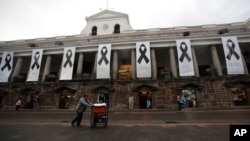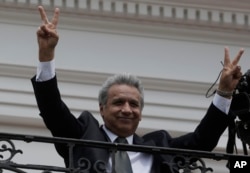President Lenin Moreno said Wednesday that he is suspending Ecuador’s role as a mediator in peace talks between the Colombian government and that nation’s last major rebel army.
The decision appeared to have caught off guard Colombia’s government, which initially denied having been informed of the decision and then scrambled to play down its significance, saying it would work to find a new host for talks that have been taking place in Ecuador for more than a year.
Moreno told Colombia’s RCN network that he made the decision because the National Liberation Army continues to carry out “terrorist” acts even while negotiating an end to hostilities.
While he didn’t elaborate, Colombia’s government suggested the decision may have been tied to Ecuador’s growing frustration as it hunts a rogue unit of the demobilized Revolutionary Armed Forces of Colombia behind the recent kidnapping of three press workers who traveled to the conflictive northern border to report on a string of deadly attacks on military targets.
Last week, Moreno said the three men had been killed by their captors, and Tuesday the dissident rebels released a proof-of-life video containing the testimony of two new civilian captives.
While Colombia’s battle-tested military is assisting Ecuador in the search, the two governments have been at odds over the rebels’ whereabouts. Many Ecuadoreans are mystified by Colombian President Juan Manuel Santos’ apparent refusal to assume greater responsibility for violence spilling over the border from his country’s drug-fueled, half-century civil conflict.
“President Santos understands the pain of President Moreno and Ecuadoreans for the recent, tragic events,” Colombian Foreign Minister Maria Holguin said in a statement. “The Colombian government will not give up in its search for peace that, like President Moreno says, belongs not just to Colombia but the entire region.”
Colombia initiated formal peace negotiations with the ELN almost immediately after reaching a historic deal with the FARC in 2016 that saw almost 7,000 guerrilla fighters lay down their weapons and form a political movement.
But the talks have been plagued by setbacks almost from the outset, and a temporary cease-fire between the two sides expired in January without yet being renewed. Meanwhile, the void left by retreating FARC rebels has opened a new power struggle in remote areas like the Colombia-Ecuador border region among dissident FARC fighters, ELN combatants and heavily armed drug gangs.
The ELN, whose ranks don’t surpass 2,000 fighters, was started in the 1960s by Roman Catholic priests inspired by Fidel Castro’s revolution in Cuba. Unlike the highly centralized FARC, the ELN’s command structure is more diffuse, making it harder for top commanders in Ecuador to control the actions of its fighters.
The group is labeled a terrorist organization by the United States.





